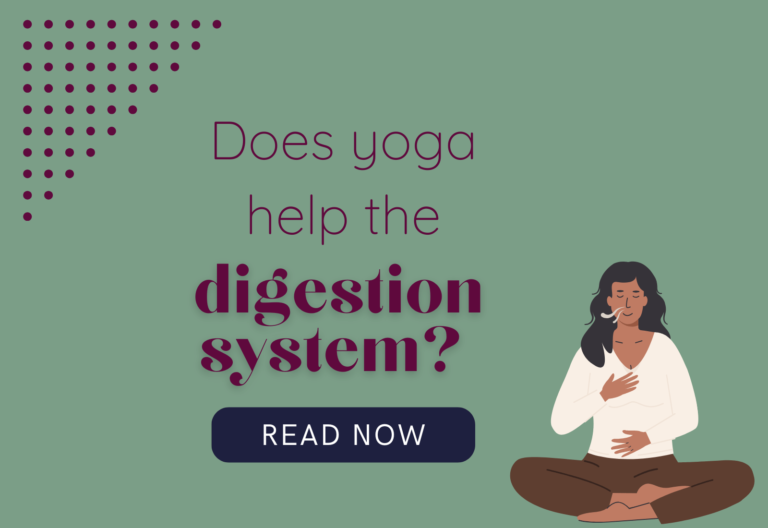Does yoga help the digestion system?
A healthy digestive system is crucial for both your physical and mental well-being. The digestive system plays an essential role in absorbing nutrients and eliminating waste, and it even affects your mood and energy levels. The intestines are one of the most important organs in this system, which is why it is important to understand how they work and why they are so vital to your health.
What to expect in this blog
The digestive system: a well-oiled machine
The digestive system consists of various organs that work together to break down food, absorb nutrients, and eliminate waste. Digestion begins in the mouth, where food is chewed and mixed with saliva. It then travels down the esophagus and is transported to the stomach. In the stomach, food is further broken down by gastric juices and muscles that knead the food.
Next, the food mixture enters the small intestine, where most of the digestion takes place. Here, digestive juices from the pancreas and gallbladder are added to break down fats, proteins, and carbohydrates. The intestines absorb the nutrients and send them into the bloodstream. What remains moves into the large intestine, where water and some final nutrients are absorbed. The waste is then excreted through the rectum.

The Connection Between the Brain and the Gut: The Brain-Gut Axis
What may be less well-known is that the intestines have a direct connection with the brain. This happens through the **brain-gut axis**, a communication channel that continuously exchanges information between the brain and the digestive system. This connection occurs via the vagus nerve, a nerve that runs throughout the body and is involved in important functions such as heart rate and breathing.
What is remarkable is that the intestines are the only organ that has its own nervous system, called the enteric nervous system. This means that the intestines not only receive signals from the brain but also send signals back to the brain, for example, when you feel full or when your gut flora is out of balance. The microbiome, which consists of billions of bacteria, plays a key role in this. These bacteria influence your mood and health and can even impact your mental well-being (Watts, 2018).
A healthy gut flora is essential for both healthy digestion and a good mood. When your gut flora becomes imbalanced, for example, due to unhealthy diet or stress, it can lead to inflammation or digestive issues. And this not only has physical consequences but can also affect your mental health. Stress and anxiety, for example, can disrupt the balance in your gut, which in turn can lead to stomach issues or constipation.
Yoga and Constipation: The Power of Breathing and Asanas for Healthy Digestion
Constipation, also known as being “backed up,” is a common issue that can affect people of all ages. It occurs when someone has fewer than three bowel movements per week, leading to discomfort and sometimes even pain. Constipation can be the result of various causes, both physical and psychological. In this blog, we will explore how yoga—particularly breathing exercises and certain asanas—can contribute to improving digestion and relieving constipation symptoms.
There are various physical causes of constipation:
Slow bowel movements: Due to slowed peristalsis, stool and fluid can accumulate.
Pelvic floor issues: Sometimes, there is dysfunction in the pelvic floor muscles or the anal sphincter, making it difficult to pass stool.
Inadequate response to the urge: When you ignore the urge to go to the bathroom, stool can pile up and dry out.
In addition to these physical causes, psychological factors such as stress and anxiety can also contribute to constipation. Stress activates the sympathetic nervous system, which can slow down bodily functions such as digestion. Chronic stress can lead to prolonged digestive issues, including constipation.
The Effect of Yoga on Constipation
Yoga is an ancient practice that is increasingly recognized in the modern world as an effective method for promoting overall health. Yoga focuses on the balance between body and mind, and it can help alleviate physical discomforts such as constipation. There are various aspects of yoga that are particularly beneficial for digestion, including breathing exercises (Pranayama), asanas (yoga postures), and meditation.
Breathing and Constipation
Breathing plays a vital role in yoga, and the way we breathe can impact the function of our intestines. Yoga uses breathing techniques that not only improve the breath itself but also calm the nervous system and reduce stress—a key factor in constipation.
Deep belly breathing is one of the most effective breathing techniques for constipation. In this type of breathing, the diaphragm moves down, directly exerting pressure on the intestines and providing a light massage. This stimulates blood circulation in the abdomen and promotes bowel movements.
Breathing exercises such as nasal breathing (breathing through the nose instead of the mouth) help promote relaxation in the body and reduce stress. This not only contributes to healthier digestion but also calms the nervous system, activating the parasympathetic nervous system—the system responsible for rest and recovery.
Another useful breathing technique is abdominal lock breathing (Uddiyana Bandha), where the diaphragm is drawn up to stimulate a deeper massage of the intestines. This technique helps promote digestion and can also increase energy levels.
Asanas and Digestion
In addition to breathing exercises, certain yoga postures (asanas) can promote the function of the intestines. Particularly the postures that involve twisting, forward bending, and those that massage the abdominal area, can help relieve constipation by stimulating internal organs.
Jathara Parivrtti (Abdominal Twist): This twisting posture in supine position stimulates the abdominal muscles and massages the organs in the abdomen, which can help improve digestion and relieve constipation.
Apanasana (Knees to Chest Pose): This gentle pose in supine position helps open the hips and lower back while massaging the intestines and promoting bowel movements.
Uttanasana (Standing Forward Bend): This forward bend helps compress the intestines and stimulates peristalsis. It encourages digestion and helps release toxins.
Ardha Matsyendrasana (Seated Spine Twist): This spinal twist massages the abdomen and stimulates the intestines and liver.
By regularly practicing asanas that massage the abdominal area, you can improve digestion and reduce constipation symptoms. Yoga not only physically stimulates the intestines but also promotes relaxation of the nervous system, which is essential for healthy digestion.
Sitting Still and Meditation
In addition to physical postures, meditation plays a significant role in promoting healthy digestion. Yoga teaches us to be present with a calm mind, and actively reducing stress can help restore healthy gut function.
When we integrate meditation into our yoga practice, we help relax the body and also improve blood circulation to the abdomen and intestines. This promotes digestion and reduces stress, which is one of the primary causes of constipation.
Conclusion
Constipation is a common issue, but fortunately, there are effective ways to relieve it, and yoga provides powerful tools for this. Breathing exercises, asanas, and meditation not only improve the physical functioning of the intestines but also calm the nervous system, which is essential for healthy digestion. By practicing yoga regularly, you can enhance not only your physical well-being but also support your mental health, contributing to a healthy and balanced digestive system.
Yoga thus offers a holistic approach to improving gut health, helping to relieve constipation and find a better balance between body and mind.
Do you wanna read more:
Yoga therapy for digestive health – Charlotte Watts

Can yoga help you reduce stress?
Yoga has long been celebrated as an effective tool for stress relief, offering a natural way to calm the mind and body. This ancient discipline brings together a variety of techniques—physical movement, breath control, and mental focus—that are designed to counteract the pressures of modern life.




